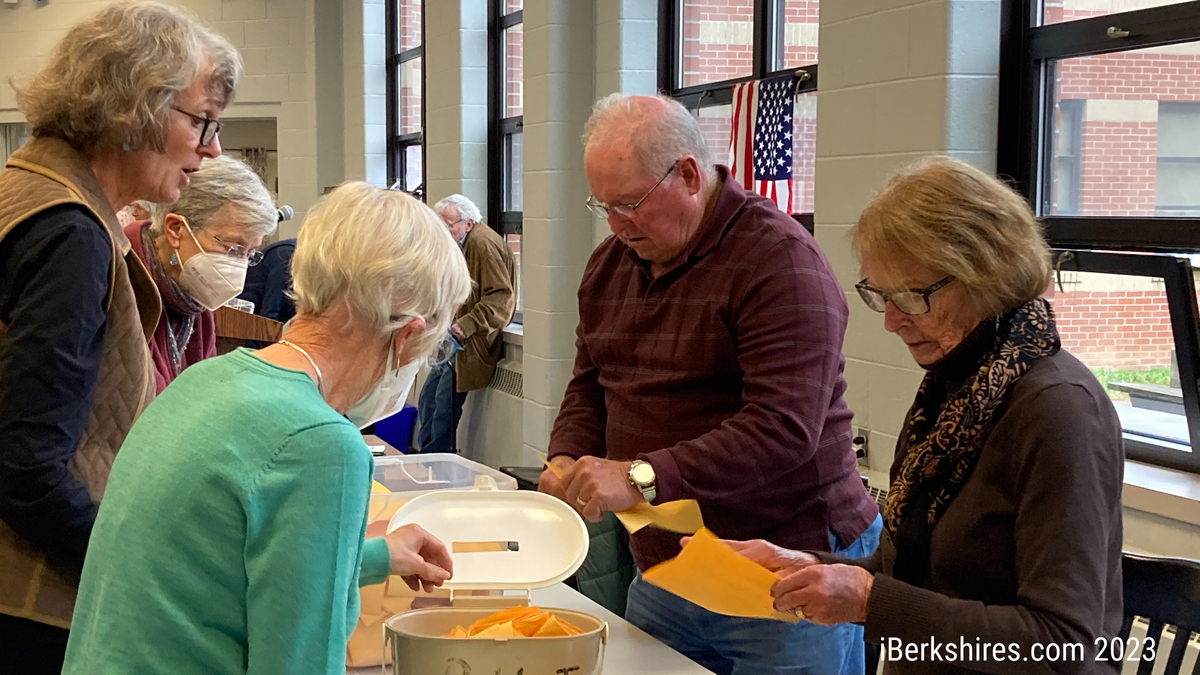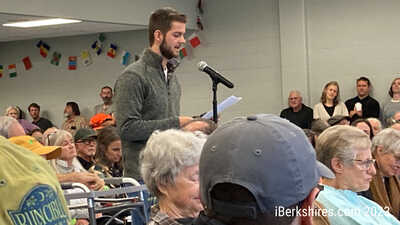Egremont Rejects School Merger; Advocates Say 'May Be Options'By Stephen Dravis, iBerkshires.com Sports
03:20PM / Saturday, October 21, 2023 | |
 Egremont Town Clerk Juliette Haas and her crew count ballots on Saturday morning in the Mount Everett Regional High School cafeteria. Egremont Town Clerk Juliette Haas and her crew count ballots on Saturday morning in the Mount Everett Regional High School cafeteria. |
 | | Mount Everett senior Nathan TenBroeck addresses Egremont's special town meeting. |
Updated Saturday evening with a reaction from the 8 Town Regional School District Planning Board.
Updated Oct. 24: All Southern Berkshire towns except for Alford (106-23) voted down the merger; all three Berkshire Hills towns voted in favor by wide margins.
SHEFFIELD, Mass. — Egremont’s special town meeting Saturday morning overwhelmingly rejected a plan that would have merged the Southern Berkshire Regional School District with the Berkshire Hills Regional School District.
By a vote of 143-78, members said no to a new Southern Berkshire Hills Regional School District that would have joined the five towns in the SBRSD with the three in the BHRSD and eventually replaced the existing Mount Everett and Monument Mountain high schools with a new 9-12 school on the Monument Mountain campus.
The merger of the two districts was dependent on a positive vote in all eight of the proposed member towns. The other seven have scheduled their special town meetings for Monday, Oct. 23. Officials from the 8 Town Regional School District Planning Board have said those towns should go ahead with their meetings regardless of the outcome in Egremont.
Saturday morning's secret ballot vote came after about an hour of debate in the cafeteria at Mount Everett.
Perhaps the most emotional testimony came from a current senior at the high school.
“Student concerns have been overlooked and overshadowed by the planning board,” Nathan TenBroeck told a standing room crowd in the cafeteria.
TenBroeck said that students would not feel the same in a merged district and that they would lose their “sense of identity” and culture if forced to go to school at a new, merged high school.
“Students have been treated as statistics on a brightly colored graph for too long,” the 18-year-old TenBroeck said.
“Today is my first time voting, and I will gladly vote no on the merger.”
Several meeting members talked about the loss of community and identity if the Southern Berkshire towns lose Mount Everett, which had a student enrollment of 294 in grades 6-12 in the 2022-23 academic year, according to the Massachusetts Department of Elementary and Secondary Education.
One speaker said her daughter told her of friends who enrolled at Mount Everett after experiencing “bullying” at Monument Mountain.
Another, Ellen Maggio, dismissed dire warnings from the 8 Town committee of continued enrollment declines in the South County towns, telling the meeting that she had been hearing such predictions for the Southern Berkshire Regional School District for decades.
Maggio said that getting rid of Mount Everett would only accelerate any population loss in the region’s five towns.
“If we close our high school because we’re moving into a new district, I think there will be a giant sucking sound in Sheffield,” Maggio said. “We’ve built this school. We’ve built this community. Why would we give that up?”
The first speaker to the microphone when temporary Moderator Charles Proctor opened debate was the 8 Town committee chair, who gave a shortened version of merger advocates’ reasons why it makes sense to combine the two regional school districts.
Lucy Prashker, a resident of Alford, told the Egremont residents that the two regions combined have seen a 45 percent decline in enrollment since 2000.
“Especially for high school students, that’s a real challenge,” Prashker said. “It means a reduction in academic choices, extracurricular choices and social choices. We will be able to expand those choices by bringing together the best of both districts.”
And, she emphasized, the planned high school for the new merged region would be able to offer six Chapter 74 vocational programs. Currently, Monument Mountain offers three voc programs; Mount Everett has none, but students from the Southern Berkshire district can study vocational programs at Monument Mountain through the commonwealth’s School Choice program.
It is relatively easy to “choice” into the Great Barrington high school because it was built for 700 students, far more than the current 9-12 population in the Berkshire Hills Regional School District, 472 in the most recent academic year.
The proposed high school for a merged district would be built for 620 students; if the Berkshire Hills district ends up standing alone and builds a replacement for the current Monument Mountain, that school would be built for a target enrollment of 485, Prashker said.
That number drew a question from Egremont Select Board member Mary Brazie.
“Why is Berkshire Hills saying, ‘If we don’t get a merger, we will only build a high school big enough for Great Barrington and Stockbridge students?” Brazie asked.
Prashker explained that any school building project would be a partnership with the Massachusetts School Building Authority, which establishes a projected target enrollment for the communities served by a building – in the case of the Berkshire Hills district, Great Barrington, Stockbridge and West Stockbridge.
“I’m sure Berkshire Hills would be happy to build a bigger school,” Prashker said. “The 485 number is from the MSBA.”
Several meeting attendees, pointing to a provision in the proposed regional agreement that nullifies this week’s merger votes if the towns don’t approve bonding for a new high school by June 30, 2025, indicated the merger plan itself is motivated by a desire to get Great Barrington a new high school and have its neighbors help pay for it. The chair of the Egremont Select Board, George McGurn, told the meeting that he believes the total price tag for that high school is considerably more than the $100 million projected by the 8 Town committee.
Perhaps anticipating these arguments, Prashker said in her opening remarks that the proposed regional agreement apportions 10 percent of the cost for a new high school to the five current Southern Berkshire district towns; that number would rise 1 percent per year up to 15 percent after 2033, when the SBRSD’s “legacy debt” for capital outlays is retired.
“If you have a $500,000 home in Egremont, that means an additional $52 per year, assuming the new building costs $100 million,” Prashker said. “If the cost rises by 50 percent, that’s another $26 per year [for a $150 million building].
“That’s pretty reasonable, considering the benefit.”
In the end, the meeting members decided there is more benefit to preserving what Southern Berkshire Regional School District already offers.
And at least one of the members raised the specter that a merged district could spell trouble for the South Egremont School’s pre-kindergarten program.
Jared Kelly, who serves on Egremont’s Planning Board, reminded residents that the two-room schoolhouse has been threatened by the budget ax before and argued that the proposed regional agreement does not adequately protect existing primary schools.
According to the agreement, school closures could occur on an 8-3 vote of the newly formed School Committee with representatives from at least six of the eight towns voting in favor plus a majority vote in at least six of the eight member towns.
“Which three towns are going to step in to save the South Egremont School?" Kelly asked his fellow Egremont residents. “Wake up. We need an agreement that preserves our elementary schools.”
On Saturday evening, the 8 Town committee released a statement in reaction to Saturday morning's vote that emphasized the need to hear from residents of the other seven towns on Monday.
"We had hoped for a different result in Egremont," the statement read. "But everyone’s voice should be heard."
"If Egremont were the only town to vote no – there may be other options. We might go back to Egremont to ask their voters to reconsider based on the will of their neighbors. Or we might find a way to tweak the agreement to satisfy concerns. Or we might decide to explore the possibility of a seven-town region.
"We can’t know whether any of those options are viable without knowing where the voters in each of our 8 towns stand. And that is why it is so important -- whether you are a 'yes' or a 'no' — that you go to your special town meeting and vote."
| 
